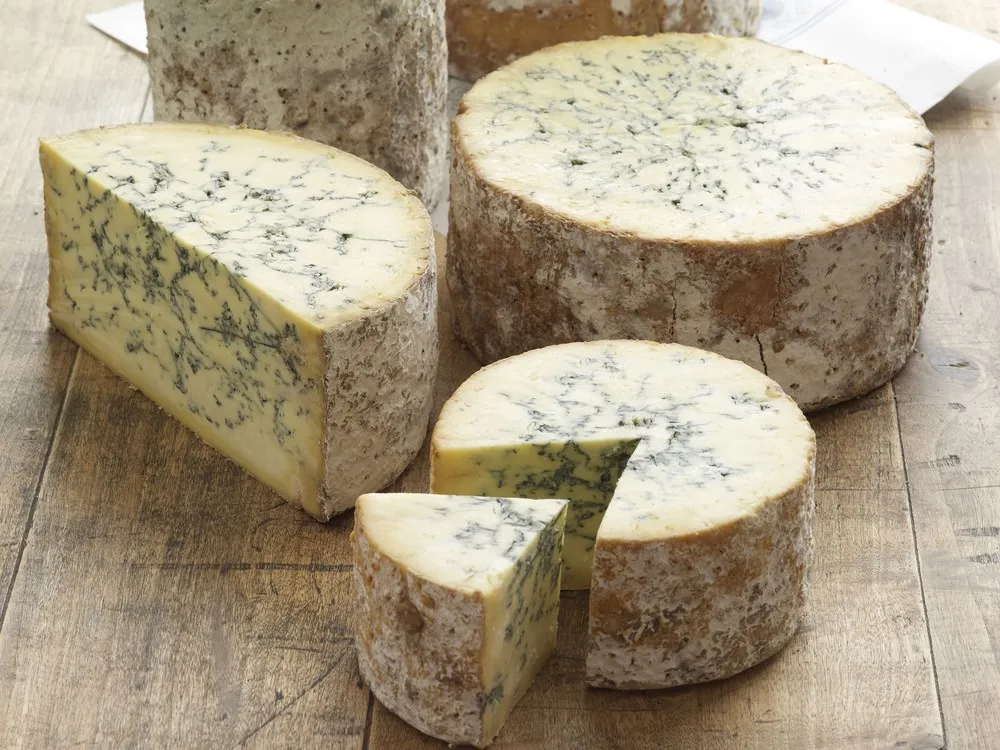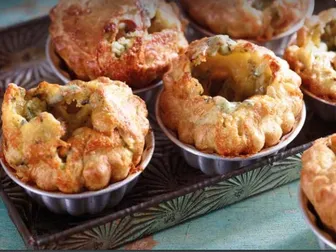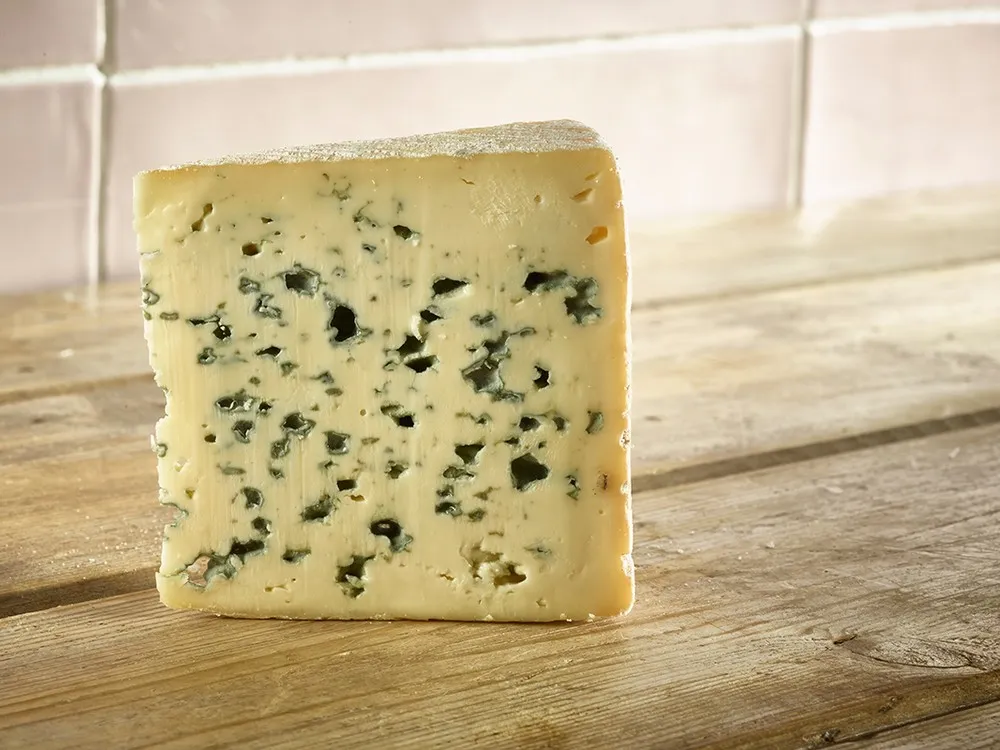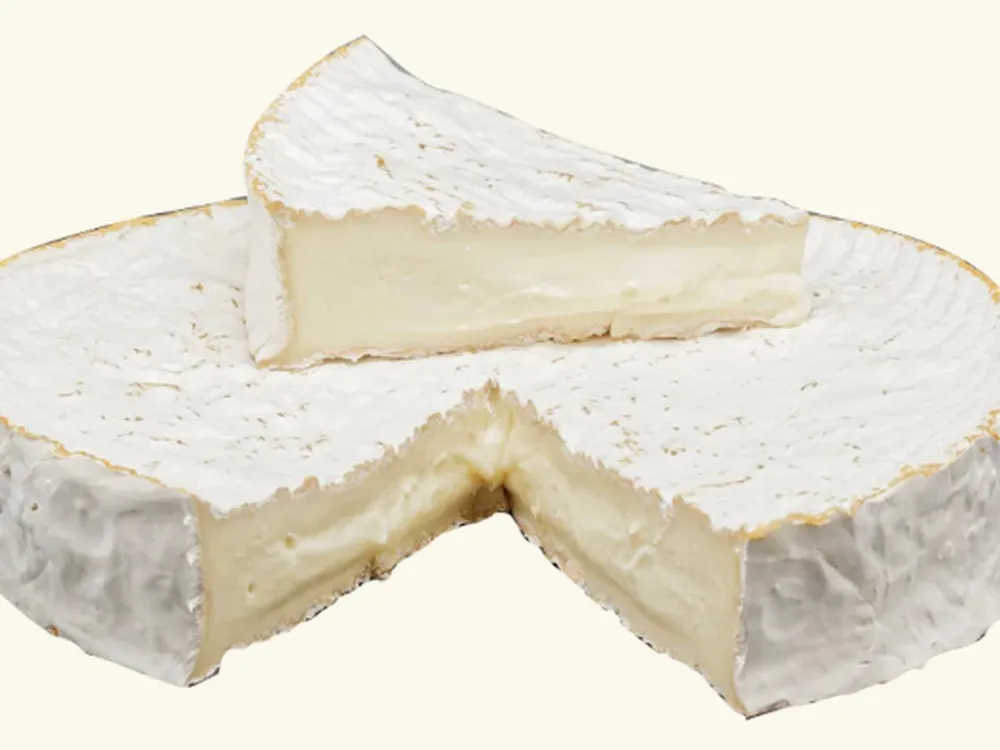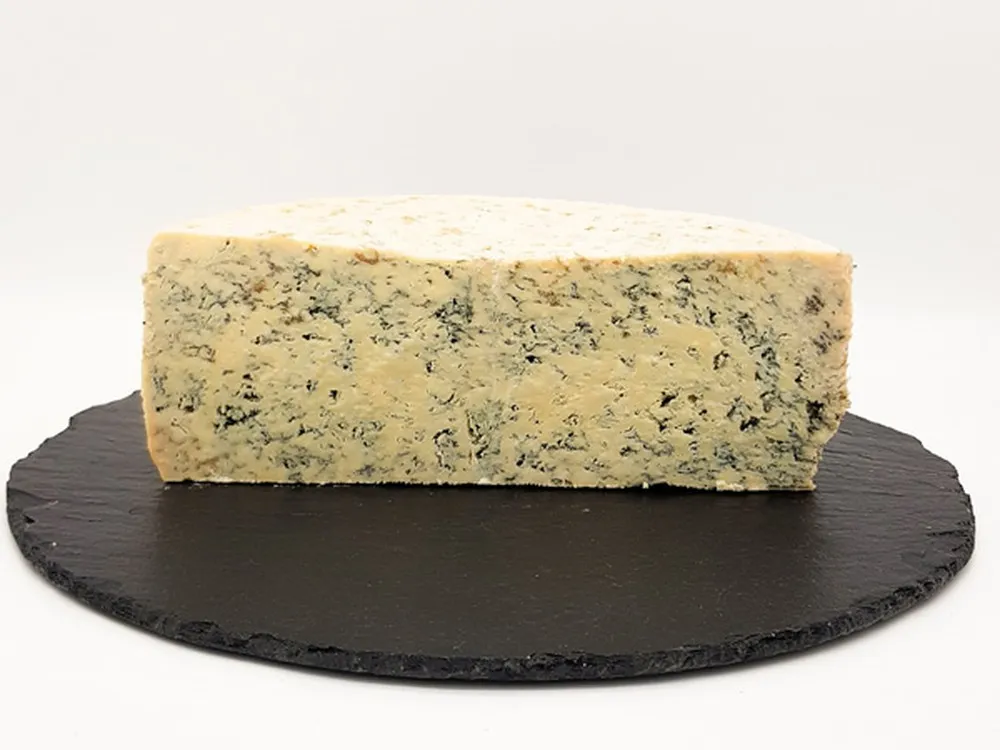Stilton
What is Stilton Cheese? What Does Stilton Taste Like?
Stilton cheese is a well-known and delicious British cheese with a distinctive taste and divine texture. It is the only British cheese to have a Certification Trade Mark and an EU Protected Name.
Stilton is only ever produced in the three counties of Derbyshire, Nottinghamshire, and Leicestershire. The cheese is made from locally produced pasteurized cow's milk. It is made in a cylindrical shape and allowed to form its own coat or crust. The distinctive feature of this cheese is magical blue veins radiating from the center all the way out to the periphery. Traditionally paired with sherry and port wine, it is also an excellent choice to go with walnuts, crackers, biscuits, and bread.
What Does Stilton Cheese Taste Like?
Describing the taste of Stilton is something of a challenge, as it boasts a complex and unique flavor profile. The cheese's rich and creamy texture, coupled with its crumbly and slightly tangy taste, is a true indulgence for cheese enthusiasts. Its intense and pungent aroma, a delightful blend of sweet, savory, and sharp flavors, makes it a must-try for any cheese lover.
Stilton also has a hint of earthiness, with notes of blue mold that add depth to its taste. The blue veins running through the cheese contribute to its complex flavor, providing a delightful contrast to the creamy base. It is this combination of flavors that sets Stilton apart from other blue cheeses, making it a favorite among cheese connoisseurs.
What Kind of Cheese is Stilton?
Stilton falls under the classification of blue cheese. It is one of the most famous types of blue cheese and originates from England. Made from pasteurized cow's milk, Stilton is a semi-soft cheese that undergoes a unique aging process. It is often crumbled or melted, which allows its rich flavor to infuse into dishes.
What is Stilton Cheese Made Of?
Stilton is made using pasteurized cow's milk sourced from local farms. The process starts by adding rennet and cheese cultures to the milk, creating curds. The curds are then cut into small pieces and stirred gently. They are further drained and pressed to remove excess moisture. After that, the cheese is pierced with stainless steel needles to facilitate the growth of blue mold.
The cheese is then aged for a minimum of three months, during which time it develops its distinct flavors and textures. Stilton cheese is protected by a PDO (Protected Designation of Origin) status, which means it can only be produced in certain areas of England and must follow specific production methods to retain its authentic character.
How Long Does Stilton Cheese Last?
The shelf life of Stilton cheese varies depending on its age and how it is stored. Unopened Stilton cheese can last for several weeks to a couple of months when refrigerated at temperatures between 35-45°F (2-7°C). However, it is vital to keep the cheese adequately wrapped to prevent it from drying out or absorbing odors from other foods.
Once opened, Stilton cheese should be consumed within a week for the best quality. It is advised to wrap the cheese in wax paper or cling film to preserve its freshness. If the cheese develops any mold other than the characteristic blue mold, it is recommended to discard it.
White Stilton Cheese vs. Blue Stilton Cheese
There are two main types of Stilton cheese: white Stilton and blue Stilton, alongside flavored varieties such as white Stilton with mango and ginger. White Stilton is the milder version of the two and lacks the distinctive blue veining found in blue Stilton. It has a creamy and crumbly texture with a mild, slightly sweet flavor. White Stilton pairs excellently with fruits and is often used in dessert recipes.
Blue Stilton, on the other hand, is the classic variety known for its bold blue mold veining. It has a more robust flavor and a tangier taste compared to its white counterpart. Blue Stilton is versatile in the kitchen and can be enjoyed on its own or added to various dishes, such as salads, pasta, or sauces, to enhance their flavors.
Why is Stilton Blue Cheese So Expensive?
The production process of Stilton cheese is labor-intensive and time-consuming, and as a consequence, it is often sold at a premium. Stilton must also adhere to strict quality standards and follow specific geographical indications to maintain its authenticity. These factors, along with the limited production areas, make Stilton a specialty cheese that commands a higher price in the market.
The aging process of Stilton cheese also contributes to its high cost. The longer the cheese is aged, the more intense and developed its flavor becomes, resulting in a higher price tag. The complexity and uniqueness of Stilton cheese justify its premium pricing, making it a delicacy for cheese lovers around the world.
Is Stilton Cheese Healthy?
While Stilton cheese is undoubtedly delicious, it is important to consider its nutritional aspects; as with most cheeses, Stilton contains significant amounts of fat and calories. However, it also offers several health benefits when consumed in moderation.
Stilton cheese is not just a treat for the taste buds, it also offers several health benefits. It's a good source of protein, calcium, and phosphorus, essential for muscle growth, strong bones, and teeth. Additionally, it contains vitamins A and B12, crucial for a healthy immune system and proper nerve function. So, while it's important to enjoy Stilton cheese in moderation, you can savor its distinct flavors knowing it's contributing to your overall health.
It is worth noting that Stilton is not suitable for individuals with lactose intolerance or those following a strict low-fat diet. However, it can be enjoyed in moderation as part of a balanced diet to reap its nutritional advantages while savoring its distinct flavors.
Stilton Cheese Calories and Nutrition
Here is an approximate nutritional breakdown for a 1-ounce (28-gram) serving of Stilton cheese. Results may vary from cheese to cheese.
- Calories: 100
- Total Fat: 8.1 grams
- Saturated Fat: 5.3 grams
- Cholesterol: 21 milligrams
- Sodium: 325 milligrams
- Protein: 6.1 grams
- Calcium: 150 milligrams
It is important to keep in mind that the nutritional composition may vary slightly depending on the specific brand and aging process of the Stilton cheese.
Conclusion
Stilton cheese is truly a remarkable and beloved cheese known for its distinct taste and texture. Its creamy yet crumbly consistency, combined with its unique blend of flavors, makes it a delicious and versatile ingredient.
Whether you opt for the mild and creamy white Stilton or the bold and tangy blue Stilton, you're in for a culinary adventure. The rich history and PDO protection of Stilton cheese make it a versatile ingredient that can elevate a variety of dishes. Its distinct taste and texture, combined with its unique blend of flavors, make it a delicious addition to any recipe.
So, indulge yourself and try a piece of Stilton so that you, too can experience the sensory delight that this British treasure has to offer.

Over 200,000 page views per month, Put your store on our map!
Contact UsOther English cheeses:
Yorskshire Puddings
Initially called Dripping Pudding, the first records of this recipe date back to 1737, and it is undoubtedly one of the most iconic examples of …
Stilton cheese is a delicious, creamy blue cheese that has been enjoyed for centuries. It has a unique flavor with tangy undertones and a rich, crumbly texture. However, sometimes you may find yourself in a situation where you don't have Stilton cheese on hand or are looking for an alternative. …
Read MoreStilton Q & A
-
Is Stilton Lactose Free?
Individuals with lactose intolerance require careful monitoring of their dairy consumption. The lactose content in cheese varies depending on …
Read More -
Is Stilton Vegetarian?
Vegetarians often face challenges when attempting to identify suitable cheese options due to the use of animal-derived rennet in …
Read More -
Is Stilton Gluten-Free?
For individuals with gluten sensitivities or celiac disease, it's helpful to know that Stilton is naturally gluten-free, making it …
Read More -
Does Stilton Melt?
When it comes to melting, Stilton behaves differently from some other cheeses. Due to its crumbly texture and unique …
Read More -
How to Store Stilton?
Proper storage is crucial to maximize the shelf life of Stilton and maintain its flavor and texture. Unlike some …
Read More -
How Long Can Stilton Sit Out?
Stilton, like other perishable foods, shouldn't be left out at room temperature for more than two hours.
When hosting …
Read More -
Can You Freeze Stilton?
Freezing is an excellent way to prolong its shelf life. However, before you toss that Stilton wedge into …
Read More -
Can Dogs Eat Stilton?
When it comes to canine companions, Stilton should also be consumed with caution. While dogs can tolerate small amounts …
Read More -
Can Cats Eat Stilton?
We all know how curious our feline friends can be when it comes to food. However, it's important to …
Read More -
Can You Eat Stilton While Pregnant?
Stilton cheese, like other blue-veined cheeses, carries a potential risk of listeria contamination. Listeria is a harmful bacterium that …
Read More


